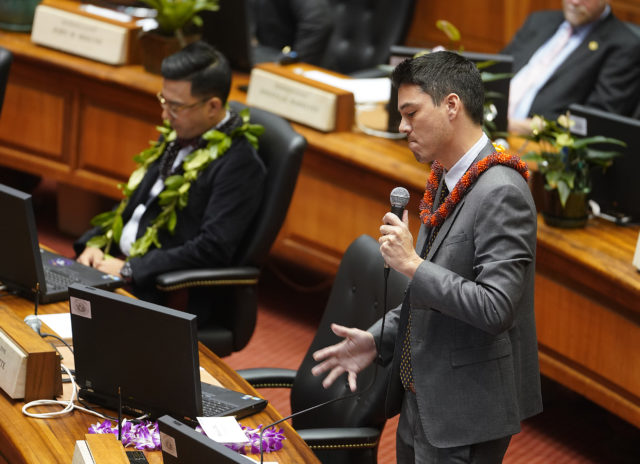A Hawaii lawmaker is trying to crack down on what he says was improper behavior by the Maui County film commissioner, who accepted a substantial part in a television movie being shot on the island, despite the commissioner’s involvement facilitating the industry.
would prohibit movie and television producers — at least those getting big cash incentives from the government — from hiring state and county employees “whose official capacity is related to motion picture, digital media, or film production.”
In an interview, Quinlan said the bill was prompted by Maui County Film Commissioner Tracy Bennett, who raised concerns from the actors’ union, among others, when he accepted a role in a  TV movie called “Maneater” despite having almost no acting credits.
NOTE: A previous version of this article referred to “Maneater” as a Hallmark movie based on , which Civil Beat did not independently verify.

Quinlan’s measure says movie and television productions can’t hire government officials who oversee the movie business in Hawaii if the productions want to participate in Hawaii’s motion picture incentive program. As part of the program, the state cuts checks paying productions 20% to 25% of what the productions spend in Hawaii.
Under the statute setting up the program, the collective payout to Hollywood each year is $50 million.
Given the big dollars involved,ĚýQuinlan, who chairs the House Economic Development Committee, said it’s important for state officials to maintain oversight and accountability for the program, which supports an army of workers on big-budget movies and television series like “Hawaii Five-0.” He said the best way for state officials to do that is to tweak the statute that governs the program.
According to his bio, Bennett is involved in administering the incentive for Maui productions.

The Maui Ethics Code, which is part of the , generally requires appointees like Bennett to “demonstrate by their example the highest standards of ethical conduct to the end that the public may justifiably have trust and confidence in the integrity of government.”
It also prohibits officers like Bennett from any business activity “which is incompatible with the proper discharge of the officer’s or employee’s official duties or which may tend to impair the officer’s or employee’s independence of judgment in the performance of the officer’s or employee’s official duties.”
But Quinlan said the Maui Board of Ethics hasn’t responded to his queries to find out whether Bennett’s actions amounted to an ethics violation, and Quinlan said he has no other recourse. Quinlan said the bill would close a loophole that allows government officials to escape accountability in such cases.
The Maui Board of Ethics referred calls to Maui Corporation Counsel Moana Lutey who did not respond to a request for comment. Bennett also did not respond.
The bill passed unanimously out of the Economic Development Committee earlier this month and has just one more referral, before the House Finance Committee. The committee’s chair, Rep. Sylvia Luke, is particularly hawkish and skeptical of tax incentive programs, which could bode well for Quinlan’s bill in the House.
Still, the bill has its . For example, Christine Acham, chair of the University of Hawaii Center for Creative Media, testified the bill could have the unintended consequence of preventing faculty, who are state employees, from taking jobs on productions.
Roy Tjioe and Ricardo Galindez, principles of the local producer Island Film Group, said concerns about hiring government officials should be addressed by existing ethics rules. They noted that the mayor of San Francisco, London Breed, was cast in the latest “Matrix” movie.
Others questioned whether changing the movie incentive law, which is part of the Hawaii tax code, was the proper way to deal with a conflict of interest already identified in ethics laws.
“It is unclear why motion pictures and digital media are being singled out in this bill for special unfavorable treatment,” the Tax Foundation of Hawaii said in written testimony. “The measure seems unfair for that reason.”
In an interview, Randy Roth, a retired professor of tax law, agreed.
“It sounds like something needs to be addressed here, but there’s got to be a better way than to fiddle with the tax law,” he said.
But Quinlan said the tax law was exactly what needs to be looked at because the tax law governs the film incentives that drive business to the islands. In fact, Quinlan said he would like to increase oversight, transparency and accountability of , which provide incentives for a variety of industries, including renewable energy, commercial fishing, cesspool upgrades and research activities.
Quinlan also was unmoved by the local producers’ implication that Hawaii shouldn’t prevent its mayors from being in movies, since San Francisco’s mayor was in one.
“I don’t think San Francisco’s mayor should be in movies either,” he said. “It sends the wrong message.”
Civil Beat’s coverage of Maui County is supported in part by a grant from the Nuestro Futuro Foundation.
 Sign up for our FREE morning newsletter and face each day more informed.
Sign up for our FREE morning newsletter and face each day more informed.
We need your help.
Unfortunately, being named a finalist for a Pulitzer prize doesn’t make us immune to financial pressures. The fact is, our revenue hasn’t kept pace with our need to grow,Ěý.
Civil Beat is a nonprofit, reader-supported newsroom based in ±á˛ą·É˛ąľ±Ę»ľ±. We’re looking to build a more resilient, diverse and deeply impactful media landscape, and we hope you’ll help by .
About the Author
-
 Stewart Yerton is the senior business writer for ĚěĂŔĘÓƵ. You can reach him at syerton@civilbeat.org.
Stewart Yerton is the senior business writer for ĚěĂŔĘÓƵ. You can reach him at syerton@civilbeat.org.




